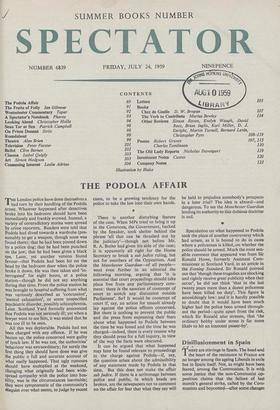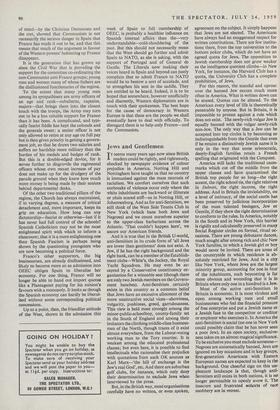Disillusionment in Spain
THERE are stirrings in Spain. The head and 1 the heart of the resistance to Franco are no longer among the ageing Liberals in exile but in Spain itself. Not, as might have been feared, among the Communists. It is with some justice that the non-Communist op- position claims that the failure of last month's general strike, called by the Com- munists and boycotted—after some changes
of mind—by the Christian Democrats and the rest, showed that Communism is not necessarily the serious danger in Spain that Franco has made it out to be, and that this means that much of the argument in favour of the Western powers' bolstering up Franco disappears.
It is the generation that has grown up since the Civil War that is providing the support for the committee co-ordinating the non-Communist anti-Franco groups; young men and women many of whose fathers are the disillusioned functionaries of the regime.
To the extent that many young men among its sympathisers are army officers of an age and rank—subalterns, captains, majors—that brings them into the closest touch with the troops, the Army may turn out to be a less reliable support for Franco than it has been. A complicated, and typi- cally fascist fiddle has kept the colonels and the generals sweet: a senior officer is not only allowed to retire at any age on full pay but is then given priority in getting a govern- ment job, so that he draws two salaries and suffers no hardship more military than the burden of his medals and badges of rank. But this is a double-edged device, for it serves further to disgruntle the regimental officers whose own recent increase of pay does not make up for the drudgery of the parade ground when they know how much more money is being made by their seniors behind departmental desks.
Of the other two traditional pillars of the regime, the Church has always maintained, if in varying degrees, a measure of critical detachment and, more important, keeps its grip on education. How long can any dictatorship—fascist or otherwise—last if it has never had full control of the schools? Spanish Catholicism may not be the most enlightened spirit with which to inform a classroom; that it is a more enlightening one than Spanish Fascism is perhaps being shown by the questioning youngsters who are now becoming a political force.
Franco's other supporters, the big businessmen, are already disillusioned, and likely to become more so as admission into OEEC obliges Spain to liberalise her economy. For one thing, Franco will no longer be able to hand out import quotas like a Plantagenet paying for his minion's favours with a monopoly. It looks as though the Spanish economy can hardly be liberal- ised without some corresponding political concessions.
Up to a point, then, the friendlier attitude of the West, shown in the admission this week of Spain to full membership of OEEC, is probably a healthier influence on Spanish internal affairs than the—very understandable—cold-shouldering of the past. But this should not necessarily mean that the West should go further and admit Spain to NATO, as she is asking, with the support of Portugal and of General de Gaulle. The Liberals now making their voices heard in Spain and beyond can justly complain that to admit Franco to NATO would be to bestow a sort of accolade, and to strengthen his seat in the saddle. They are entitled to be heard. Indeed, it is to be hoped that somewhere, however unofficially and discreetly, Western diplomatists are in touch with their spokesmen. The best hope for the cause of democracy in Western Europe is that these are the people we shall eventually have to deal with officially. To disregard them is to help only Franco—and the Communists.







































 Previous page
Previous page